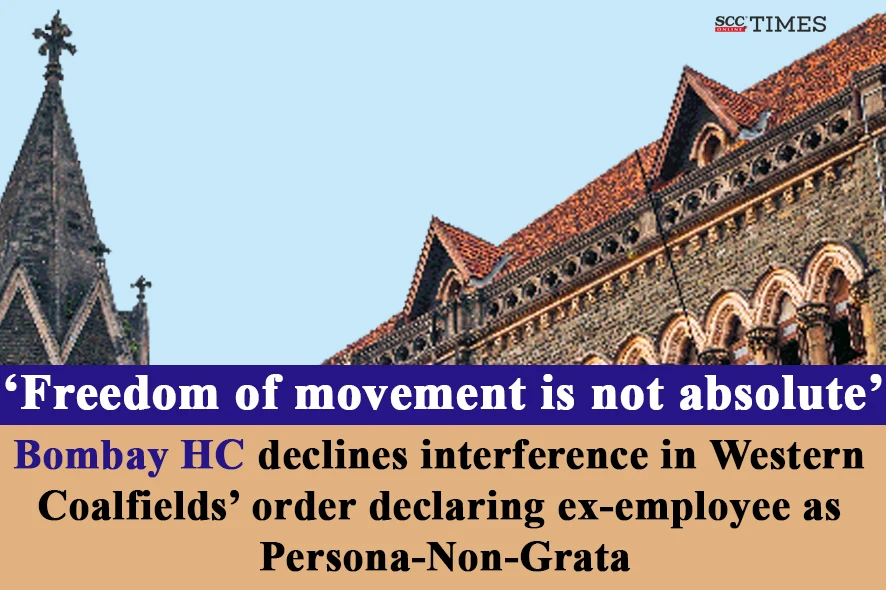Bombay High Court: The instant writ petition was filed, challenging the order passed by Western Coalfields Limited (respondents), declaring an ex-employee (petitioner), as persona-non-grata. The Division Bench of Rajnish R. Vyas* and Anil S. Kilor, JJ., noted that the petitioner had filed multiple frivolous cases against the officials of the respondent and had even tried to blackmail and harass them, therefore, he could not be given free hand to visit the public offices as it would affect the public administration. The Court opined that if the petitioner, being a social activist, needed to file complaints, he could do so by post or by electronic means. Furthermore, the Court held that the fundamental right to travel throughout the country, guaranteed under the Constitution was not absolute and was subject to reasonable restriction which would be applicable in the instant case. Therefore, the Court held that the order passed by the respondent against the petitioner did not warrant any interference.
Background
The petitioner used to work for the respondent, and his services were terminated by the respondent in 2004. The petitioner was a social activist therefore he used to file various complaints against the respondent, for employees and other persons aggrieved by the respondent and its officials and redressed their grievances. In pursuance of the same, the petitioner had to visit the office of respondent multiple times.
Since many of the complaints submitted by the petitioner were found to be baseless when verified, therefore, the respondent passed an order declaring the petitioner as “persona-non-grata”. The respondent reasoned that the petitioner intentionally filed baseless complaints to malign the image of the respondent. The respondent also contended that the entry of the petitioner into the Public Sector Office was viewed with as a threat to the security of their establishment. The respondent had previously also passed similar order against the petitioner, but his behaviour did not change, despite making repeated attempts to make the petitioner understand the gravity of situation. The order also stated that the petitioner visited the office in an unauthorised manner during the working hours. The respondent later also passed a restraining order against the petitioner in order to prevent him from entering the office for 3 years.
The petitioner had earlier filed a writ petition against the similar order which was dismissed by the Court stating that the petitioner, being out of employment, could not, as a matter of right, be permitted to enter the office as relationship between parties was strained.
Aggrieved by the recent order passed by the respondent, the petitioner filed the writ petition before the present Court.
Analysis, Law and Decision
The Court explained that “Persona-non-grata” meant an unwelcomed person, therefore declaring a person as “Persona-non-grata” was essentially a way of withdrawing acceptance, recognition, or entry. The Court noted that the employer-employee relationship between the petitioner and the respondent ended in 2004 when the petitioner was terminated, therefore, the petitioner cannot have absolute access to the office as a matter of right.
Furthermore, the Court observed that the petitioner was previously also declared as persona-non-grata by the respondent, which was revoked when request was made by the petitioner, on the condition that the petitioner would maintain good conduct with all the officials. Thereafter, due to breach of the conditions imposed, again the petitioner was declared as “Persona-non-grata”, but his behaviour did not change. Thus, the Court opined that it was clear from the instances that petitioner’s conduct and his intention to visit the office was only to obstruct the smooth functioning of the office. The Court stated that a person cannot as a matter of right, claim to have authority to harass public officials.
The Court observed that the petitioner was found to have violated the visitor’s entry protocol, besides unauthorizedly visiting officials during the working hours. The petitioner also wrote malicious letters levelling false allegations against the officers and management of the respondent with an intention to harass and blackmail them.
The Court, keeping in view the aforesaid observations, opined that petitioner has right to file complaints, pointing out the illegality, but it could not be forgotten that filing, frivolous and repeated complaints, burdened the public officers. The Court emphasised that petitioner could file the complaints online, or through post to seek the information.
Accordingly, the Court held that the petitioner had filed multiple frivolous cases against the officials of the respondent and had even tried to blackmail and harass them, therefore, he could not be given free hand to visit the public offices as it would affect the public administration. The Court opined that if the petitioner, being a social activist, needed to file complaints, he could do so by post or by electronic means. Additionally, the Court held that the fundamental right to travel throughout the country, guaranteed under the Constitution was not absolute and was subject to certain restriction, which would be applicable in the instant case. Therefore, the Court held that the order passed by the respondent against the petitioner did not warrant any interference.
[Kishor v. Western Coalfields Ltd., 2025 SCC OnLine Bom 3643, decided on: 6-10-2025]
*Judgement authored by- Justice Rajnish R. Vyas
Advocates who appeared in this case:
Advocate for the Petitioner- K.J.Chakole, Advocate
Advocate for the Respondents- Gauri Venkatraman, S.A.Chaudhari, Advocates







